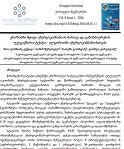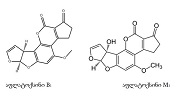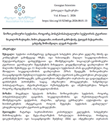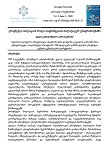Students’ Academic Freedom According to the Expert Interviews
Downloads
The article is based on qualitative research -the expert interviews. 14 professionals well-acquainted with the educational and university context working in the following spheres: philosophy, science of education, sociology, and the sphere of organizing and management of higher education participated in the research. They were former and present representatives of these spheres, members of non-governmental organizations and representatives of the civil sector who are known to Georgian society via various mass media facilities as experts on education. The research took place in Tbilisi in July and August 2023. Alongside the empirical research, the fundamental scientific works and various secondary data on academic freedom were analyzed. Since the disintegration of the Soviet Union, the universities in Georgia have not made serious progress regarding academic freedom. Though academic freedom is guaranteed and protected by the Consitution of Georgia, the general situation in the country, especially during the recent decade – economic and political instability, vulnerability of labour rights, scanty investment into education and science - does not create profitable conditions for proper development of universities. Therefore, the most important aspects of academic freedom as the condition of arranging university activities and as the fundamental value are still on the agenda in our country. Students' academic freedom is among them as well. Asa resultof the research, it became clear that the academic freedom of students is limited; the factors limiting the academic freedom of students are the following: labour market demands, limited free choice in the process of learning and research; artificial barriers existing in the university management, weakness of the organizations and movements protecting students’ interests, absence of the experience necessary to protect academic freedom, conformist culture, favouritism, hidden mechanisms of pressure and controle, bureaucracy, etc. All these and other factors hinder the realization of students'academic freedom
Downloads
დიუი ჯ. (2010). დემოკრატია და განათლება, თბ.
დვალი გ. (2012). კონცეფცია - აკადემიური თავისუფლება, ჟურნ. ლიბერალი, 26 ოქტომბერი.
ქეცბაია, კ. (2015). მეცნიერების სოციოლოგია, თბ. გამ. უნივერსალი.
ხოფერია, რ. (2021). აკადემიური თავისუფლება როგორც კონსტიტუციით გარანტირებული უფლება (შედარებით-სამართლებრივი ანალიზი გერმანიის, აშშ-ის და საქართველოს მაგალითზე), საკონსტიტუციო სამართლის ჟურნალი (სპეციალური გამოცემა - საქართველოს დემოკრატიული რესპუბლიკის 1921 წლის კონსტიტუცია). საქართველოს საკონსტიტუციო სასამართლო, ბათუმი.
Altbach, G. (2001). Academic freedom: International realities and challenges, Center for International Higher Education, Boston College.
Bourdieu, P. (1988). Homo Academicus, Stanford, California.
Boyer, J W.( 2002). Academic Freedom and the Modern University, Chicago.
Dworkin, R. (1996). We Need a New Interpretation of Academic Freedom, Chicago.
Kayrooz, C. Akerlind S (2003), Understanding Academic Freedom: The views of social scientists, Higher Education Research & Development Vol. 22, No. 3, November.
Karran, T. (2009). Academic Freedom: In Justification of a Universal Ideal, Studies in Higher Education, Vol. 34, No. 2.
Karki, C.B. (2015). Academic Freedom for Faculty Members and Students, Oslo.
Keith, K. (1996). Faculty Attidudes Toward Academic Freedom: Tenure, Teaching and Re search Doctoral Dissertation, University of Southern California.
Haddon, A. (1987). Academic Freedom and Governance: A Call for Increased Dialogue and Diversity. Texas Law Review.
Kobakhidze, N, Samniashvili, L. (2022). Less USSR, more democracy please!” Hope and discontent in Georgia's quest for academic freedom, Including Special Issue on Academic Freedom in the Re‐Imagined Post‐Humboldtian Europe, Volume76, Issue3.
Guinness, K. (2002). The Concept of Academic Freedom. New York.
Manan, W. (2000). Academic Freedom: Ethical Implications and Civic Responsibilities. In The Universities’ Responsibilities to Society: International Perspectives, ed. Guy Neave, Kidlington: Elsevier Science.
Osieja, H. (2016). Academic Freedom: Foundations, Limitations and delimitations, 8th International Conference on Education and New Learning Technologies, 4-6 July,
Barcelona.
Sunstein, C.R. (1996). Academic freedom and law: Liberalism, speech codes, and related problems, Chicago.
Shiell, T.C. (2006). Three conceptions of academic freedom. Stanford University Press.
Tierney, G, Lechuga V. M. (2005). Academic Freedom in the 21st Century, National Education Association. Washington.
Tight, M. (1988). So what is academic freedom? In M. Tight (Eds.), Academic freedom and responsibility. Stony Stratford: Open University Press.
Copyright (c) 2023 GEORGIAN SCIENTISTS

This work is licensed under a Creative Commons Attribution-NonCommercial-NoDerivatives 4.0 International License.


























































































































































































































